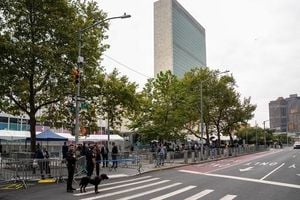On March 17, 2025, Conor McGregor met with Donald Trump at the White House during a St. Patrick's Day celebration, where he didn't hold back in criticizing the Irish government's immigration policies. As he stood alongside prominent figures, including National Security Advisor Michael Waltz, McGregor lamented, "Our government has long since abandoned the voices of the people of Ireland." He asserted that the "illegal immigration racket is running rampant" across the country.
This statement reverberated back in Ireland, with Taoiseach Micheál Martin quickly condemning McGregor's remarks, stating that they undermine the spirit of St. Patrick's Day. Martin's comments aimed to underscore that the day should reflect community, humanity, friendship, and fellowship, which he believed McGregor misrepresented. He stated, "Conor McGregor's remarks are wrong and do not reflect the spirit of St. Patrick's Day, or the views of the people of Ireland."
Following the Irish Prime Minister's criticism, Deputy Prime Minister Simon Harris also weighed in, emphasizing that McGregor does not represent Ireland or the people, insisting, "He has no mandate to do such." This backlash wasn't new for McGregor, who has been a vocal critic of the Irish administration, especially concerning its immigration policies, since the anti-immigration riots in 2022. In fact, McGregor's stance has been more than just talk; he has suggested he might run for President of Ireland in 2025.
During the meeting at the White House, McGregor also presented a signed cap that read ‘Make Ireland Great Again’ to White House Press Secretary Karoline Leavitt, symbolizing his support for right-wing politics in America. His image was showcased as an ally to Trump's strong immigration policies, which have seen a resurgence amidst increasing tensions surrounding illegal immigration in the U.S. and Ireland alike.
Amid the controversy, McGregor remarked on Martin's response, stating, "Shame on him for saying that, for speaking down on an Irish man." He defended his words against the backdrop of his litigation history, where he was found civilly liable last year for assaulting a woman at a Dublin party in 2018, required to pay roughly $273,000 in damages. He continues to appeal this decision while eyeing a potential return to politics.
The issue of immigration has surged to the fore in Irish politics as asylum seeker numbers reached unprecedented levels, stirring public discontent and protests against refugee accommodations. Nevertheless, McGregor’s unapologetic remarks come at a time when Trump's policies are mirrored by the rising voices of populism in Europe—a situation that makes him all the more appealing to a specific voter base.
Still, one has to question whether McGregor's approach represents the views of the broader Irish public or merely his self-interest as he eyes political ambitions. As the former UFC champion expressed his aspirations, he declared, “Ireland needs an active President employed wholly by the people of Ireland. It is me. I am the only logical choice.” This bold assertion begs exploration: Is he simply seeking attention, or does he genuinely believe he could lead a nation?
The atmosphere surrounding McGregor is charged, with political implications seeping through his remarks. He has established himself as a divisive figure in Ireland; he's sometimes viewed as a voice for the voiceless but also criticized for igniting discontent. As he navigates his way through this political landscape, McGregor's recent visit to Trump highlights his desire to align himself with decision makers in an era where populism is alive and well.
His remarks during this visit have drawn significant attention and highlighted the acceleration of radical views spilling into mainstream politics. With each comment, McGregor seems more willing to capitalize on current sentiments while challenging the status quo — though the ultimate question persists: will he make it on the ballot next year?
In the backdrop of all this, Trump's administration has maintained a stance on immigration that resonates with certain factions within Ireland. Among many commissioners, the support for Trump's approach remains contentious; McGregor appears to stake his claim as a figure ready to foster those sentiments into something political.
Still, the reaction from both governments is a clear indication that they may not welcome an outsider trying to enter their domain. As MMMA fans and political skeptics watch closely, we're left to consider what a McGregor presidency might look like and just how much impact he could wield should he succeed in earning a spot on the ticket.
Conor McGregor left Washington with significant media traction, repeating his back-and-forth with Martin as he left a parting blessing saying, “God bless Ireland, God bless America.” Despite the division his remarks have caused, it's possible we are merely witnessing the early stage of his political career. The implications of his statements will undoubtedly linger, and the Hawaiian fight legend must navigate a tricky pathway if he has hopes to lead the Republic of Ireland in the near future.





